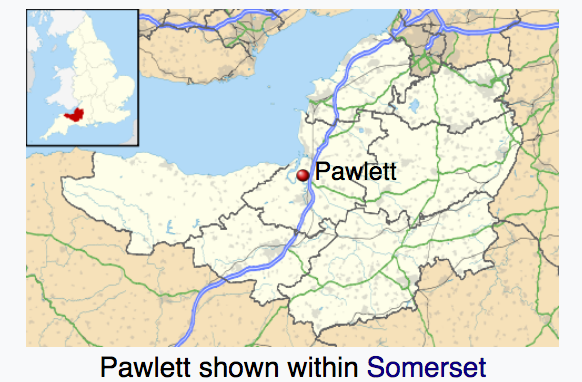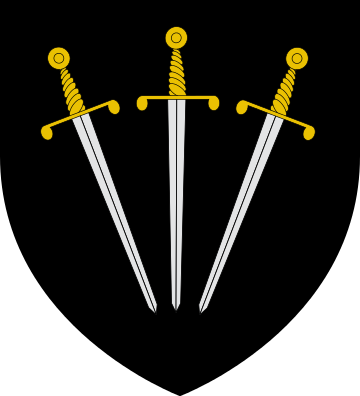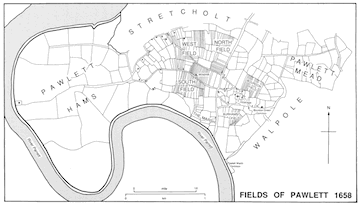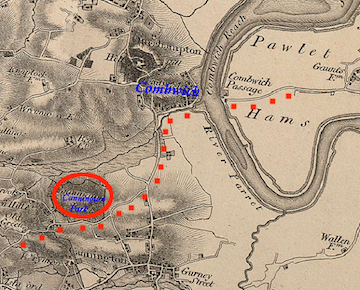Pollett Genealogy
If you are not a Pollett family member, but want to feel some connection, check out an article on how many generations back before we are all related. A European alive 1000 years ago has a 20% chance of having no living descendants, but also has an 80% chance of being related to every living person of European descent. Similar results exists for any Eurasian or African living not too much further in the past, and so on for wider groups. In a real sense, if you can prove yourself a direct descendant of a distant ancestor, you are arguing that person is directly related to everyone.
Origins of the Pollett Family Name
Chris Pollett, Aug. 7, 2017
(Images except next to an associated link are from Wikipedia,
books were obtained from archive.org)
books were obtained from archive.org)
To begin there are several names that are spelt almost like Pollett, for example, Pollet with one t . Although similar in spelling, it is possible that people with this name belong to a completely different family. The "Pollet with one t " name seems to have existed in France and Belgium for several hundred years. The Pollet Gang, for which the death penalty was re-instituted in France, is a notorious example of this name. The Pollet spelling might come from Le Pollet, France, a quartier of Dieppe. Le Pollet derives its name either as a corruption of Port d'Est or from the Norse word pollr for basin. Romance language surnames similar to Pollett might also be derived as a diminutive of Paul or from the words Hippolyte or Spoleto. In Canada, the Mi'kmaq surname Poulette, which looks quite similar to Pollett, probably derives from the French words poule + ette for chick. The matrilineal clan symbol for Poulette is plawej meaning partridge, so the name probably morphed from one to the other under French influence. The name does not appear in any English-Mi'kmaq treaties from the 1700's that I could find, showing the name was likely not common (at least among people who can sign treaties) in the English speaking parts of Nova Scotia at the time. In the Acadian-Mi'kmaq census of 1871, ten people had this surname, the oldest 97, and all but two were female, suggesting the French spelling might have been influenced by the slang for a pretty girl.
The Pollett surname, at least for those who come from the United Kingdom, the Commonwealth, and the United States, seems to be of a different origin. From personal family trees, I know I get my surname from Newfoundland Pollett's who came from England in the 1770s. From Ancestry DNA results, I know I have a strong match for English Newfoundlanders and Southern English genetic communities. Further, the English Newfoundlanders according to Ancestry.com largely came from Dorset or Devon. The Port of Bridgwater Wikipedia Entry also indicates trade between Bridgwater, Somerset and Newfoundland in the 1700s. In Newfoundland and some parts of Australia, this origin can also be seen in the influence of the West Country English dialects on the local English. As we will see, the origin of the English Pollett surname spelling seems to come from the village Pawlett in Somerset which is toward the southwest of England.
One way to trace the origins of a name is to look at Baptism, Marriage, and Burial data. https://www.freereg.org.uk/ provides a searchable index of such data from the 1500s to the present for the United Kingdom. It constantly has new records added to it, so should be viewed as not entirely complete, but still relatively representative of populations. Conducting a baptism, marriage, burial search for the exact name Pollett for each county in the United Kingdom for the dates 1400-1800 yielded:
pollett-uk-1400-1800.txt. This file has not been cleaned up. The date 1400 was chosen to be well before the earliest record in the FreeReg databases (some time in the 1500s). From this we can see that the Pollett name has been used in the United Kingdom at least over the entire period covered by FreeReg. Pollett only appears in 24 counties: Buckinghamshire (1), Cornwall (1), Derbyshire (1), Devon (1), Dorset (1), Durham (2), Essex (25), Hampshire (1), Huntingdonshire (1), Kent (23), Lancashire (169), London (25), Middlesex (4), Norfolk (51), Northhamptonshire (1), Northumberland (2), Somerset (243), Staffordshire (10), Suffolk (1), Sussex (10), Warwickshire (1), Wiltshire (1), Yorkshire North Riding (4), Yorkshire West Riding (31). The number in parentheses is the number of records for that county with some attempt to remove duplicates. As one can see the greatest concentrations of Pollett's appear in Somerset and in Lancashire. If one restricts to entries before 1600 one gets: Derbyshire(1), Lancashire (14), Middlesex (1), Norfolk (4), Somerset (19), Sussex (3), Yorkshire West Riding (8). This shows the three main places where Pollett's seem to come from is Somerset, Lancashire, and Yorkshire West Riding.
Interestingly, you can play the same game for the Pollitt last name (i rather than e ). The only counties that had Pollitt entries before 1700 are Norfolk (5, earliest 1618) and Lancashire (17, earliest 1684). There is some evidence that some Pollett's such as Thomas Pollett born in 1640 in England also spelt their name as Pollitt. So Pollett is likely an older variation of the same name, with Pollitt developing some time in the 1600s. If you look at http://forebears.io/surnames/pollitt, Pollitt seems to have become more popular than Pollett as of 2017.
So what are the earliest uses of the name Pollett with this exact spelling? Two sources for dated lists of surnames are: alumni lists for universities and volumes of royal letters and papers. The site British History Online provides access to both kinds of documents. For the Oxbridge universities, we have Pollett Sounding Surnames Oxford 1500-1714 and Pollett Sounding Surnames Cambridge earliest times-1900. Notice there are no entries for Cambridge and only two Oxford:
Powlet, John (Paulet, Poulett, or Pollett) B.A. 22 Nov., 1530, M.A. 6 June, 1532, proctor 1534; one of these names rector of Sampford Peverell, Devon, 1540-59, of Hinton St. George 1558-68, and of Seavington St. Michael, Somerset, 1558-68, perhaps dean of Jersey. See Foster's Index Eccl. & Fasti, i. 105.and
Powlet, Robert (Paulet or Pollett) B.A. 23 Feb., 1537-8.
These entries associate the name Pollett with the spellings Powlet, Paulet, and Poulett. Since these are actually the only entries with the spelling Pollett, although there are many entries with the other spellings, it hints the Pollett descendents probably didn't do as well as the other descendants, or that this personal spelling became less popular. The John Powlet entry also suggests a connection between the Pollett name, Somerset, and Hinton St. George.
So why was the name spelt Pollett some times and not the other variations? Early references to the name Pollett appear in the letters and papers of Henry VIII. For example, in June, 1514 we have a reference to Sir Amias Pollette (this is too early to be a reference to Sir Amias Paulet). On April 30, 1533 we have the entry:
406. The King's Woods. Certificate of Leonard Reade to Sir Will. Pollett and Thos. Cromwell, general surveyors of the King's woods, made 30 April 25 Hen. VIII., touching the condition and extent of the woods in the forest of Barnwoodde (bailliwicks of the Frythe, Pawnsell, Ixsill and Kingswood), Schotover and Stowe wood. Signed Leonard Reed, and with six other signatures.If we look at the Pollette entry in the index of the volume associated with the Amias Pollette records, we get Pollet or Pollette. See Paulet . To me this suggests that there is an official "King's/Queen's" English spelling of the name, Paulet, and then there is the spelling that the person himself or the person creating a record uses. Because of this, field records, deeds, etc. might contain different spellings, and so there is a need for an index entry to consolidate these diverse spellings under the official spelling for legal purposes. Sir Hugh Paulet, Governor of Jersey, is an example of this phenomena, his official name is Paulet, however, he wrote his name, Poulet. Notice the Hugh Paulet Wikipedia entry and the Hugh Paulet House of Parliament Biography entry mention his father was Sir Amias (likely the one mentioned above) and his younger brother John was the last Roman Catholic Dean of Jersey, matching the Oxford reference. Islandwiki.org has a history of all three of these Paulets, corroborating this connection. From these references, we get that the father spells his name Pollette, the first son spells it, Poulet, and the other son spells it, Pollett sometimes. Finally, official records would have grouped these all under Powlet or Paulet.
So far we have seen that there is some evidence associating the Pollett name with the Paulet name and in associating the Pollett name with Somerset and Hinton St. George. The most famous Paulet's from this area are the descendants of the 1st Marquess of Winchester, William Paulet. There is little evidence that all people whose name was grouped under Paulet (Powlet, Poulet, Pollette, Pollett, etc.) are direct descendants of him, but he was likely at least some kind of cousin. In fact, if we look at William Paulet's Bio on the History of Parliament page, it mentions he was "surveyor, King’s woods by 1533," exactly matching the date of the Pollett instance quoted above. Since the coat of arms, a black sable fur tincture background, with three silver (argent) swords pointing downwards (en pile):
seems to derive from him, this gives some support that it should be viewed as coat of arms for at least some of the Pollett family. From Hampshire County Maps (from Martin and Jean Norgate's site), we can see how this coat of arms evolved. The Paulet motto, Aymez Loyauté , dates to a later date than the coat of arms. It dates to the English Civil War, and the siege of Basing House by Cromwell. The royalist 5th Marquess lived at Basing and supposedly wrote, Aymez Loyauté, on all the windows during/after the siege. Given the motto's later appearance, there is less of a case that this should also be considered the motto of the Pollett family, rather than just the Paulet motto.
We can quantify to some extent that William Paulet was an important enough figure to warrant reasonably detailed surviving records. Recall a Marquess typically rules over a march, which is like a county except that it borders a different country, in this case, Wales. As a march shares a border with a different country, a marquess might be expected to defend this border. In British peerage, it is a rank beneath a duke, but above an earl. An earl is above a viscount, and a viscount is above a baron. William Paulet (1483-1572) was the first Marquess. He served Henry the VIII and had a number of other titles such as Earl of Wiltshire and Baron St John. He was born in Fisherton Delamere (read: de la mer), Wiltshire, the county next to Dorset. Skip ahead five to six generations, we get to Charles Paulet 1 and Charles Paulet 2, the 1st and 2nd Dukes of Bolton, who also wrote their surnames as Powlett, similar to the Powlet entries given above. These descendants show William Paulet is the founding figure of a branch of the family that gained in prominence for several generations.
Here is a list of William Paulet's ancestors as obtained from https://www.geni.com/:
- William Paulet (1483-1572)
- Sir John Paulet III of Basing 1452
- John Paulet, Esq. 1427 (also Paulett) Sheriff of Hampshire (Basing)
- John Paulet 1400 (also Paulett) Basing
- William Melcomb Paulet July 20, 1368 (Paulett, Somersetshire, Eng)
- John Paulett II 1354 Rhode, Somerset, England
- Sir John Paulett 1297 (also Poulett) Creedy, Devon, England (died in 1356 Paulett)
- William IV de Paulett 1265 born Pawlet, Bridgewater, Somersetshire, England
- Walter de Paulett 1245 (also de Paulet and de Poeleth) Born Rhode, Somersetshire, England
- William II de Paulett born around 1210 (Paulett, Bridgewater, Somerset, England).
- William de Paulett (also de Paulet and de Poulett) 1185? (Paulett, Bridgewater, Somerset, England).
- Sir Alexander de Paulett (in Latin ' de Puilleta', also de Aunou, probably Hercule de Tournon), of Leigh (born 1155 Paulett, Bridgewater, Somerset)
"De Alexandro de Puilleta 10 sol. pro plegio" is a one line reference to Sir Alexander de Paulett in the Magni rotuli scaccarii normanniae sub regibus anglia , 1184 (Great Rolls of the Exchequer of Normandy). Most of what's known about Alexander de Paulett is from similarly short references in Chancery Rolls (Rot. Cane), records of Knights fees (Testa de Nevil), and so on. Questionable Pollett ancestors earlier than Alexander are:
- Fulk De Aunou II (Fulco de Alnou II) sometime after 1066
- Fulk De Aunou (Fulco de Alnou, Foulques d'Aunou) sometime in the 990s
- Balderic the Teuton , 1st Lord of Bacqueville (Baldric Teutonicus) 977
- Wigerius (Wiger) , born 952, one of a number of Jewish traders brought into Normandy from Germany by Duke Richard 1st in an endeavour to boost trade in Normandy.
The above genealogy seems to generally agree with Manor and Estate Information from British History Online and with The Norman People, H. S. King and Co., 1878. From the above birthplaces, we can see that the names Paulet and Paulett are connected with the village Pawlett and the name de Paulett becomes Paulett in the 1350s or so. Here is the transcription of the weathered, Saxon-Greek epitaph of Alexander de Paulett (using a Latinized-version of his style, de Aunou) and his wife Erenburga found on the wall of the door of the chapter-house of the monastery of Bath:
Hic jacet Alexander de Alneto et Erenbuerga uxor ejus, et Fulco de Alneto filius eorum, et Lucia de Maricis filia eurum, et Jordanus de Maricis filius ejusdem Luciae, et Willielmus de Maricis filius esjudem Jordani. My rewrite of this in English guided by a translate tool is: Here lies Alexander de Alneto, the son of Fulco (Falcon) de Alneto, his wife Erenbuerga, and his daughter, Lucy de Maricis, and her son, Jordan de Maricis, and Jordan's son, William de Maricis.
In summary, we have established that the Pollett name was a spelling variation of Paulet, and that the Paulet name has its origins in the village named Pawlett in Somerset, England. Given the gap between Fulk De Aunou II and Sir Alexander de Paulett (de Aunou), it is unclear if the Paulet's originally had a different surname and came over during the Norman Invasion of 1066, or if they were just people who were living in Pawlett. The Duchess of Cleveland, Wilhelmina Powlett wrote a three volume set (V1, V2, V3) trying to reconstruct The Battle Abbey Roll that supposedly listed the companions of William the Conqueror. To this day, however, according to Cokayne's Complete Peerage, there is only strong evidence for about fifteen of the names associated with the Battle Abbey Roll, so it seems uncertain to suggest any earlier lineage than Alexander de Paulett. Also, unlike the people in earlier names list, it is known where Alexander de Paulett is buried, so it might be possible in the future to get DNA from de Paulett and actually quantify the degree to which he is an ancestor of the Paulet's, Pollett's, etc. Although going back so many generations, it is quite likely anyone with ancestors in England is likely to have de Paulett as an ancestor, the number of paths to a particular distant Pollett/Paulet ancestor is probably higher for someone who already has the last name some variation on Pollett.
One open problem not addressed by the above discussion is how the village Pawlett derives its name, so I'll conclude with an account of this. Pawlett dates to Roman or Saxon times and Pawlett is mentioned in the Domesday book. According to http://www.british-history.ac.uk/vch/som/vol6/pp267-268 a Roman Axe was found in Stretcholt and Pawlett Hams has yielded evidence of both Roman and Saxon occupation. This same website, Wikipedia, and Ekwell’s English Place-Names, all say the town name Pawlett comes from the name of an 11th century estate and refers either to a stream (fleot) with stakes (pal) or refers to a stream below a steep-sided hill. The site http://www.british-history.ac.uk/vch/som/vol6/pp268-273 describes the ownership of several manors and estates in Pawlett dating to the Norman conquest. Geni's entry for Alexander de Paulett says he had a grant for half of the village, the remaining belong to De Gaunt.
Pawlett, which has less than a thousand people, and Pawlett Hams (a hams is a dry area of land between rivers or marshland) lie at a bend of the River Parrett.
The River Parrett is 37 miles long, originates in Dorset county at Chedington, and terminates in Bridgwater Bay. The name derives from the Welsh pared meaning partition. The River Parrett used to form the boundary between Saxon and Welsh territory. The Anglo-Saxon Chronicle mentions a battle won by the Saxons over the Danes on the Parrett River in 845 A.D.:
In this year ealdorman Eanwulf with the men of Somerset and Bishop Ealchstan and ealdorman Osric with the men of Dorset fought at the mouth of the Parrett with the Danish host; there was much slaughter and they were victorious.
Here is a map from the blog entry
https://oldsomerset2.wordpress.com/category/somerset/page/2/
showing where this might have occurred, Combwich, (earlier Cummidge). This is based on Saxons roads:
Robinson, Stephen (1992). Somerset Place Names also suggests, although this might be questionable, that somewhere near here is also where Ubba, the Danish raider, son of Ragnar Lothbrok (the one from the TV show Vikings), was defeated and killed by Odda in 878. The historical fiction series The Saxon Stories by Bernard Cornwell also mentions this battle.
One could imagine the stakes-in-the-stream origin of the name Pawlett as being associated with this or that other battle with the Danes, but the name derives probably from a more mundane situation where stakes were used in a fishing context, for example, as part of a weir.




